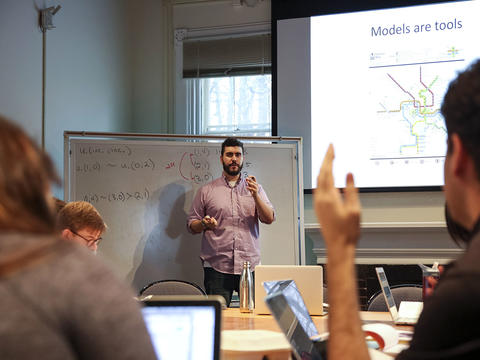
Mathematical Economics Concentration
For students majoring in economics or math, Haverford offers a concentration in mathematical economics. One of only a handful of mathematical economics programs available at liberal arts colleges, our concentration is based at the intersection of math and economics. Unlike programs that expose economics majors to a handful of math classes and math majors to a handful of economics classes, ours integrates math and economics in a unified formal program.
For our concentrators, that means a broadened set of tools and techniques as well as the capacity to engage problems and questions in the social sciences at a more sophisticated level. Our integrated curriculum also positions both majors especially well for admission to the top graduate programs in economics as well as for careers in business, finance, and public policy.
Curriculum & Courses
The program’s rich academic environment is enhanced by faculty from both departments, students with a range of interests and backgrounds, and a speaker series that brings students face-to-face with eminent researchers and practitioners whose work spans economics and math.
Concentrators pursue coursework that grounds them in math or economics (whichever subject is not their major) and enables them to see and explore the points of interaction between both disciplines.
Math majors pursuing the concentration must take four economics courses: Introduction to Economics or Introduction to Economics with Calculus; Economic Statistics with Calculus or an applied statistics course in economics or math; Intermediate Microeconomics; and an additional economics elective at the 200-level or above. Concentrators must also take two math electives on topics applicable to economics.
Economics majors in the concentration must take four math courses: Multivariable Calculus or Advanced Calculus; Linear Algebra; Analysis I, and an additional math elective. Also required are two economics electives that involve significant applications of mathematical methods.
-
Concentration Requirements
Students enrolling in the Area of Concentration in Mathematical Economics must major in either mathematics or economics.
For students majoring in mathematics, the Concentration requires six courses:
- ECON H201 (Analytic Methods for Economics)
- ECON H204 (Economic Statistics with Calculus) or MATH H203 (Statistical Methods and Their Applications), or any applied statistics course at a higher level offered by the economics or mathematics department.
- Two approved electives in economics.
- Two approved electives in mathematics. (These courses may also be used to fulfill the requirements of the mathematics major.)
For students majoring in economics, the Concentration requires six courses:
- Three required mathematics courses:
- MATH H121 (Multivariable Calculus) or MATH H216 (Advanced Calculus)
- MATH H215 (Linear Algebra)
- MATH H317 (Analysis I)
- One approved elective in mathematics.
- Two approved electives in economics. (These courses may also be used to fulfill the requirements of the economics major.)
Additional Remarks
The Area of Concentration in Mathematical Economics differs from the minors in mathematics and economics in a specific way: it focuses on the complementarities between the two disciplines; the minors in mathematics and economics are designed to provide a basic foundation in each discipline, but not necessarily an inter-disciplinary orientation.
A student majoring in economics may choose to pursue either the Area of Concentration in Mathematical Economics or a minor in mathematics, but not both. A student majoring in mathematics may choose to pursue either the Area of Concentration in Mathematical Economics or a minor in economics, but not both. A student double-majoring in economics and mathematics may not enroll in the Area of Concentration in Mathematical Economics.
Approved Electives
The courses listed below can be used to fulfill the mathematics and economics elective requirements. Not all of the courses listed below are offered every year. In some years, courses are offered that are not on these lists but that can be used as electives in the concentration. Students wishing to receive credit for an elective not listed below must obtain approval from the concentration coordinator.
Mathematics Electives
Course List Code Title Credits MATH/ECON H210 Linear Optimization 1.0 MATH H204 Differential Equations 1.0 MATH H218 Probability 1.0 MATH H222 Scientific Computing: Continuous Systems 1.0 MATH H318 Analysis II: Complex Analysis 1.0 MATH H328 Mathematical Statistics 1.0 MATH H340 Analysis of Algorithms 1.0 MATH/ECON H360 Mathematical Economics 1.0 STAT H396 Advanced Topics in Probability and Statistics: Categorical Data Analysis,Advanced Topics: Probability and Statistics 1.0 Economics Electives
Course List Code Title Credits ECON H237 Game Theory in Economics 1.0 ECON H355 Advanced Microeconomics: Uncertainty 1.0 ECON H324 Advanced Econometrics 1.0 ECON/MATH H360 Mathematical Economics 1.0 ECON H374 Jr Research Seminar: Topics in Industrial Organization 1.0 ECON H377 Junior Research Seminar: Political Economy 1.0
Associated Programs and Concentrations
Research & Outreach

Meninato will be working with the market risk team at the Federal Reserve Bank in New York after graduation.
Herring hopes to become a high school math teacher in the greater Philadelphia area after graduation.

This course on Game Theory examines mathematical models of how rational actors engage in collaboration and conflict, and connects these topics to applications in business, economics, law, politics, and biology.
Keep Exploring
More Programs
Check out our other academic offerings:
Get in Touch
Join the Mailing List or search for events in your area.
You can find detailed instructions and information on the Application Instructions page. If you need to contact us directly, please send an email to admission@haverford.edu.
Get Social with Haverford